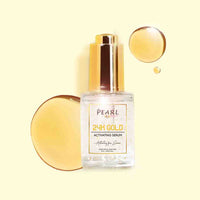A large section of population has common hair concerns in their day-to-day life. Here we learn how to combat hair fall and dandruff naturally. Even though there are many products in the market composed chemically, the effect of natural ingredients will always have promising effects when used daily. In this blog post we will understand natural remedies to combat hair fall and dandruff, DIY scalp treatments and importance of nutrition to maintain healthy hair. We will also address common questions people ask such as how to cure dandruff, how to remove dandruff in one day home remedies, how to remove dandruff quickly, home remedies for dandruff and itchy scalp and overnight dandruff treatment.
What Are The Natural Remedies To Reduce Hair fall and Eliminate Dandruff?
Natural remedies are always the best way in treating day to day hair fall. Natural products are gentle, doesn't contain harsh chemicals and are very useful in treating hair fall and dandruff. Try adding essential oils such as tea tree oil and peppermint oil to your hair care routine. Tea tree oil contains anti-microbial properties that helps fight against dandruff causing yeast and on the other side peppermint oil when applied promotes blood circulation in scalp which helps in hair growth. Research also showed that there is an increase in dermal thickness and hair follicle number when peppermint oil is applied on a regular interval time.
Onion Juice
Onion juice is also an effective remedy which can show a promising hair regrowth and significantly reduce hair fall when applied topically. Onions have high sulphur content which can combat breakage and hair thinning. Clinical trials show that there is considerable increment in hair fullness when onion juice is applied twice a day over a period of six weeks. You should never overlook your diet when it comes to hair. Eating foods that have a lot of omega-3 fatty acids, vitamins A and C, and zinc can make your hair roots stronger and lessen dandruff. Flaxseeds and walnuts, for instance, are great sources of omega-3 fatty acids, which can help make your hair more flexible and your scalp less dry.

Herbal Treatments
Herbal treatments also play a very important role in natural hair care. Aloe vera is known for its soothing and moisturizing properties. It also helps in balancing the pH of the scalp, which in turn reduces dandruff and promotes natural oil production in the scalp, which helps reduce hair fall. Aloe vera gel also helps in cleansing pores and boosting hair strength.
Fenugreek seeds are also another powerful herb that is very useful in maintaining hair health. Fenugreek seeds have proteins and nicotinic acid which help hair grow. Applying a paste of these soaked seeds to your scalp can strengthen the roots and improve scalp health, which in turn can decrease hair loss and dandruff. Not only these but also green tea, loaded with antioxidants can prevent hair loss.

What Are DIY Scalp Treatments To Maintain Healthy Hair?
DIY (Do It Yourself) treatments will help to customize our won treatments for our hair care needs. Scalp scrubs are a popular treatment which exfoliates and removes dead skin which prevents dandruff. Mixing brown sugar with coconut oil and a little rosemary oil can make a good scrub. This scrub cleans your scalp and boosts blood flow, which helps your hair grow better. Apple cider vinegar is also another helpful ingredient. The acidity of it levels out the scalp's pH, preventing yeast from growing and causing dandruff. Rinsing your hair with it after shampooing can cleanse and refresh your hair, lessen itchiness, and make it shinier. For people with severe hair fall, a mask made with mixing egg yolk and honey can provide higher nourishment. Egg yolk rich in protein rebuilds hair strength and Honey helps keep moisture in your hair.
What Is The Role Of Lifestyle To Maintain Healthy Hair?
Lifestyle changes are mostly overlooked when it comes to maintain healthy hair and scalp, but they are very important. Chronic stress in your lifestyle will damage your hair growth cycle, leading to loss of hair. To help reduce stress one should practice techniques like mindfulness meditation, yoga, regular exercise. This can benefit you in many ways and help to maintain healthy hair. Another most important factor is sleep; poor sleep patterns will weaken your immunity affecting your hair follicles and increase scalp issues. Avoiding strong hair treatments and hot styling tools can help prevent damage to your hair and scalp, reducing the risk of hair loss and dandruff. Making these lifestyle changes can support healthy hair and scalp growth.
What Nutritional Strategies To Follow To Strengthen Hair and Minimize Dandruff?
Nutrition is primary in maintaining healthy hair and scalp. To help in sebum production, hair growth and scalp health, intake of Vitamins A, E, and C are essential. They work like natural protectors against damage that can lead to hair loss and dandruff. B-vitamins, especially biotin (Vitamin B7), are well-known for making hair strong. Not having enough biotin can cause hair to become weak and fall out. Omega-3 fatty acids, which are in foods like salmon and flaxseeds, are important for moisturizing the scalp and keeping hair roots healthy. Zinc which is present in Spinach, lentils, and pumpkin seeds, can help reduce hair fall by strengthening hair follicles. Probiotics intake can help in reducing dandruff and maintaining scalp health. Following these nutritional strategies can effectively support your hair growth and fight scalp issues.

Conclusion
Using natural remedies to fight our everyday hair problems can show promising effects and can help maintain a healthy hair. The methods talked about, which include using essential oils and plant extracts, changing the diet, and following a comprehensive hair care routine, highlight the need for using multiple approaches together. Each method has its own advantages and can be customized according to specific hair needs.










